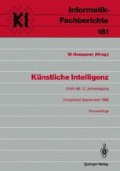Abstract
This paper explores the posssibilities of using logical quantifiers and operators to limit the accessibility of indefinite NPs for pronominalization. After briefly motivating the desirability of using purely formal, rather than knowledge-based criteria for proform resolution and generation, where possible, and reviewing a successful attempt in this direction, it systematically examines the behavior of indefinite singular NPs in the scope of a logical operator. The finding is that purely formal criteria do not suffice here, that instead a system of syntactic and semantic features is necessary and that a determination of these features must be knowledge based in crucial cases. Finally the static and dynamic knowledge sources of the natural language system WISBER are presented.
Access this chapter
Tax calculation will be finalised at checkout
Purchases are for personal use only
Preview
Unable to display preview. Download preview PDF.
References
Bergmann, H., Fliegner, M., Gerlach, M., Marburger, H., Poesio, M. (1987) IRS-The Internal Representation Language, WISBER Bericht Nr. 14
Bergmann, H. and Gerlach, M. (1987) QUIRK: Implementierung einer T-Box zur Repräsentation begrifflichen Wissens (2te erweiterte Auflage) WISBER Memo 11
Block, R. (1987) Papers on Reference and Knowledge Representation, WISBER Bericht Nr. 20
Bosch, P. (1983) Agreement and Anaphora, New York
Chomsky, N. (1982) Some Concepts and Consequences of the Theory of Government and Binding, Cambridge, Mass
Dale, R. (1986) The Pronominalization Decision in Language Generation, Department of Artificial Intelligence, University of Edinburgh, Research Paper No. 276
Ek, J. van and Robat, N. (1984) The Student’s Grammar of English, Oxford
Fliegner, M. (1988) “HOKUSKOPUS - Verwendung terminologischen Wissens bei der Analyse von Quantorenskopus und Distributivität” in this volume
Gerlach, M. and Sprenger, M. (1988) “Semantic Interpretation of Pragmatic Clues: Connectives, Modal Verbs, and Indirect Speech Acts,” to appear in Proceedings of Coling 1988, Budapest
Grosz, B. and Sidner, C. (1985) “Discourse Structure and the Proper Treatment of Interruptions” in Proceedings of the Ninth International Joint Conference on Artificial Intelligence, pp. 832–839, UCLA, Los Angeles
Heim, I. (1982) “File Change Semantics and the Familiarity Theory of Definiteness,” in Philosophy 5
Horacek, H., Bergman, H., Block, R., Fliegner, M., Gerlach, M., Poesio, M., Sprenger, M. (1988) “From Meaning to Meaning - A Walk Through Wisber”, in this volume
Hunze, R. and H.-U. Block, H.-U (1987) A Two Step Reference Problem Solver, WISBER Bericht Nr. 11
Jackendoff, R. (1977) X-bar Syntax: A Study of Phrase Structure, Cambridge, Mass
Kamp, H. (1981) “A Theory of Truth and Semantic Representation” in Groenendijk, J. et al. (eds.) Formal Methods in the Study of Language, Amsterdam
Langacker, R. (1969) “Pronominalization and the Chain of Command” in D. Reibel and S. Schane (eds.) Modern Studies in English, Englewood Cliffs, N.J
McCawley, J. (1981) Everything that Linguists Always Wanted to Know About Logic, Oxford
Mason, C. (1897) English Grammar, London
Pinkal, M. (1986) “Definite Noun Phrases and the Semantics of Discourse” in Proceedings of COLING 1986, pp. 368–373, Bonn
Poesio, M. (1987) Dialog-Oriented A-Boxing, WISBER, Universität Hamburg, Arbeitspapier
Reichman, R. (1985) Getting Computers to Talk Like You and Me, Cambridge, Mass
Reyle, U. (1985) “Prinzipien der Diskursrepräsentationstheorie” in GW AI-85, 9th German Workshop on Artificial Intelligence, pp.408–446, Dassel/Sollingen
Ross, J. (1967) Constraints on Variables in Syntax, PhD Dissertation MIT
Seuren, P. (1985) Discourse Semantics, Oxford
Stockwell, R., Schachter, P. and Partee, B. (1973) The Major Syntactic Structures of English, New York
Wada, H. and Asher, N. (1986) “BUILDRS: An Implementation of DR Theory and LFG” in Proceedings of COLING 1986, pp. 540–545, Bonn
Wasow, T. (1979) Anaphora in Generative Grammar, Ghent
Welte, W. and Block, R. (forthcoming) A Grammar of English Nouns and Noun Phrases.
Author information
Authors and Affiliations
Editor information
Editors and Affiliations
Rights and permissions
Copyright information
© 1988 Springer-Verlag Berlin Heidelberg
About this paper
Cite this paper
Block, R. (1988). Indefinite Noun Phrases and the Limits of Logic. In: Hoeppner, W. (eds) Künstliche Intelligenz. Informatik-Fachberichte, vol 181. Springer, Berlin, Heidelberg. https://doi.org/10.1007/978-3-642-74064-0_11
Download citation
DOI: https://doi.org/10.1007/978-3-642-74064-0_11
Publisher Name: Springer, Berlin, Heidelberg
Print ISBN: 978-3-540-50293-7
Online ISBN: 978-3-642-74064-0
eBook Packages: Springer Book Archive

